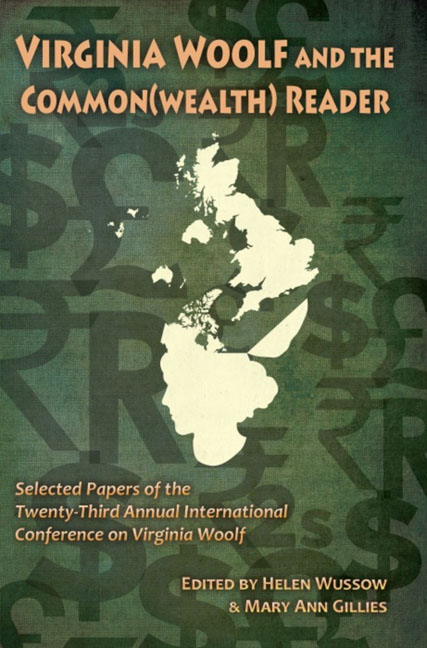Book contents
- Frontmatter
- Contents
- Introduction to Virginia Woolf and the Common(wealth) Reader
- Acknowledgments
- List of Abbreviations
- Invocations
- Networks of Affiliation: Foundations and Friends
- Woolf and the Commonwealth
- 1930s Onwards
- War, Peace, Internationalism: Bloomsbury Legacies
- “Caterpillars of the Commonwealth Unite”: Photography and Trauma in Three Guineas
- “Drawn from Our Island History”: Virginia Woolf, Nancy Mitford, and the Politics of Pageantry
- A ”Bloodless and Pernicious Pest”: The Middlebrow's “Common Man” in the Essays of Virginia Woolf
- Woolf's Troubled and Troubling Relationship to Race: The Long Reach of the White Arm of Imperialism
- Woolfian Seamarks: Commodified Women and the Racial Other on the Shores of Empire
- Documenting Fascism in Three Guineas and The Handmaid's Tale: An Examination of Woolf's Textual Notes and Scrapbooks and Atwood's “Historical Notes”
- Proportion, Conversion, Transition: War Trauma and Sites of Healing in Virginia Woolf's Mrs. Dalloway and Leslie Marmon Silko's Ceremony
- Woolf Beyond the Book
- Notes on Contributors
- Conference Program
“Drawn from Our Island History”: Virginia Woolf, Nancy Mitford, and the Politics of Pageantry
from 1930s Onwards
- Frontmatter
- Contents
- Introduction to Virginia Woolf and the Common(wealth) Reader
- Acknowledgments
- List of Abbreviations
- Invocations
- Networks of Affiliation: Foundations and Friends
- Woolf and the Commonwealth
- 1930s Onwards
- War, Peace, Internationalism: Bloomsbury Legacies
- “Caterpillars of the Commonwealth Unite”: Photography and Trauma in Three Guineas
- “Drawn from Our Island History”: Virginia Woolf, Nancy Mitford, and the Politics of Pageantry
- A ”Bloodless and Pernicious Pest”: The Middlebrow's “Common Man” in the Essays of Virginia Woolf
- Woolf's Troubled and Troubling Relationship to Race: The Long Reach of the White Arm of Imperialism
- Woolfian Seamarks: Commodified Women and the Racial Other on the Shores of Empire
- Documenting Fascism in Three Guineas and The Handmaid's Tale: An Examination of Woolf's Textual Notes and Scrapbooks and Atwood's “Historical Notes”
- Proportion, Conversion, Transition: War Trauma and Sites of Healing in Virginia Woolf's Mrs. Dalloway and Leslie Marmon Silko's Ceremony
- Woolf Beyond the Book
- Notes on Contributors
- Conference Program
Summary
I. Woolf and Mitford: The Question of Women Intellectuals
In Nancy Mitford's very popular Love in a Cold Climate (1949), Fanny, wife of an upand-coming Oxford don, explains to Lady Montadore that her husband doesn't consider women to be “intellectual[s]: You see, he doesn't believe that women ever are intellectuals, hardly, hardly, ever, perhaps one in ten million…Virginia Woolf perhaps…” (388).
My turn to Mitford is as much about reading pleasure as it is about my evolving book project. My project reveals kinks in the armor of national, cultural, and political patriarchal inheritance by examining the work of some of the canonical male writers of the 1930s; below the surface of their red or reactionary politics, young writers of the decade reveal in their fiction an acute historical sensitivity and a personal investment in their role as national subjects postwar. Women writers such as Woolf were offering similar and sympathetic critiques of national and imperial histories-cum-mythologies; constellating her late novels and essays with the work of canonical 1930s writers provides a productive response to critical approaches that seek to separate aging modernists from younger writers in the decade. Mitford's off-handed but culturally savvy reference to Woolf in Love in a Cold Climate got me thinking that perhaps Mitford, too, might be worthy of study in this context.
Mitford's 1930 novels are, according to Selina Hastings, “bright, brittle, essentially ephemeral novels so much a part of the fashion and idiom of the thirties” (129). Suspicious of the common critical narrative that so quickly dismisses Mitford's novels as high-class literary candy for middlebrow readers or as lengthy in-jokes for all those Bright Young People disguised in their pages, I seek in Mitford's early fiction her contribution to the conversation between younger novelists and aging modernists in the 1930s. What follows is an exploratory foray into Mitford's 1935 novel, Wigs on the Green, highlighting the benefits of what I am calling a “discourse of affiliation.” Constellating Mitford with Woolf—an uncommon pairing—provides a way to think through and across restrictive categories, generational, political, and aesthetic, in order to examine the way in which Englishness and national history preoccupy writers in the 1930s as they strive to revise and reimagine the national historical narratives that have left them culturally and politically disenfranchised in the postwar period.
- Type
- Chapter
- Information
- Virginia Woolf and the Common(wealth) Reader , pp. 151 - 158Publisher: Liverpool University PressPrint publication year: 2014



